Best
AFFORDABLE HARP
STRINGS
Gear4music
Harp!
-
Overall: Complete set of Nylon Strings
-
Best Feature: Replacement Strings For Gear4music Harps
-
TedScore™: 8/10
Best
OVERALL HARP
STRINGS
-
Overall: Nylon core with silver-plated copper wire winding
-
Best Feature: The full set includes strings for a 34-string harp
-
TedScore™: 9/10
Best
BEGINNER
HARP STRINGS
-
Overall: Set of 36 strings designed for Celtic harps
-
Best Feature: Covers a full range of pitches for a 36-string harp
-
TedScore™: 8/10
Imagine plucking a harp string and feeling that magical vibration under your fingertips. It’s heavenly, right?
Now, you might wonder what are harp strings made of to create a harp sound with such celestial harmony.
Given that it is also a part of the stringed instruments in an orchestra, how is its string different from the rest? What is it made of compared to pianos, violins, or guitars? This may feel a bit overwhelming!
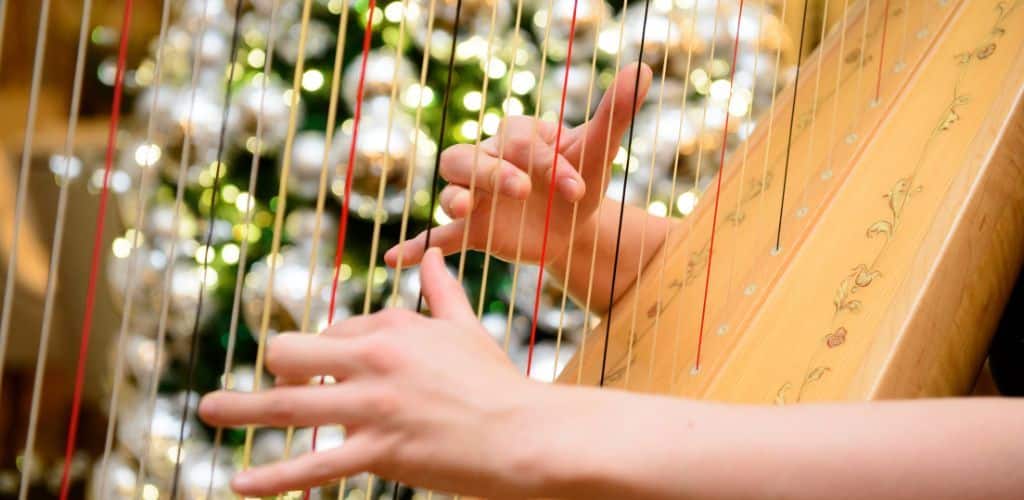
Maybe you want to change your harp strings but are unsure which one to get. Because there are so many harp string makers and strings available, choosing what to purchase can be scary!
Traditionally, harp strings were crafted from the intestines of sheep, known as gut strings, which produce a warm, rich sound.
However, modern innovation has introduced a variety of materials, each with a unique quality to the harp’s voice.
Nylon strings, for example, are a popular choice for their durability and bright tone, while wire strings made from bronze or steel ring out with a crisp resonance that can fill a room.
Materials Used in
Harp Strings
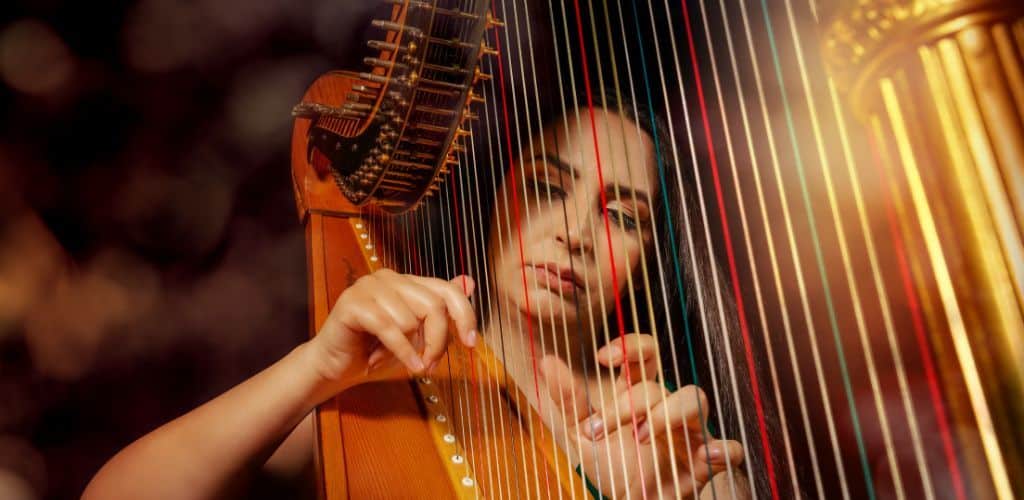
Your harp’s voice and tone are as unique as yours, and it all comes down to their individual strings!
Let’s discover these strings and how each type produces the sound we incorporate with angels and heaven!
Gut Strings
Ah, gut strings!
The traditional choice, often crafted from sheep intestine, brings your music a warm, rich tone. They’re the go-to for classical musicians seeking a sound as deep as history.
Nylon Strings
Nylon strings are the modern twist in the harp world.
They are durable and have a bright sound that is perfect for projecting your tunes across any room. Plus, they tolerate humidity like a champ, keeping tuning troubles to a minimum!
Wire Strings
Now, wire strings are where the sparkle’s at!
Made of metal ranging from copper to phosphor bronze to steel core, these strings resonate with a bell-like clarity. Wire-strung harps have that distinct metallic ring that’s beloved in many folk traditions and other harp techniques.
Factors Influencing
String Material Choice
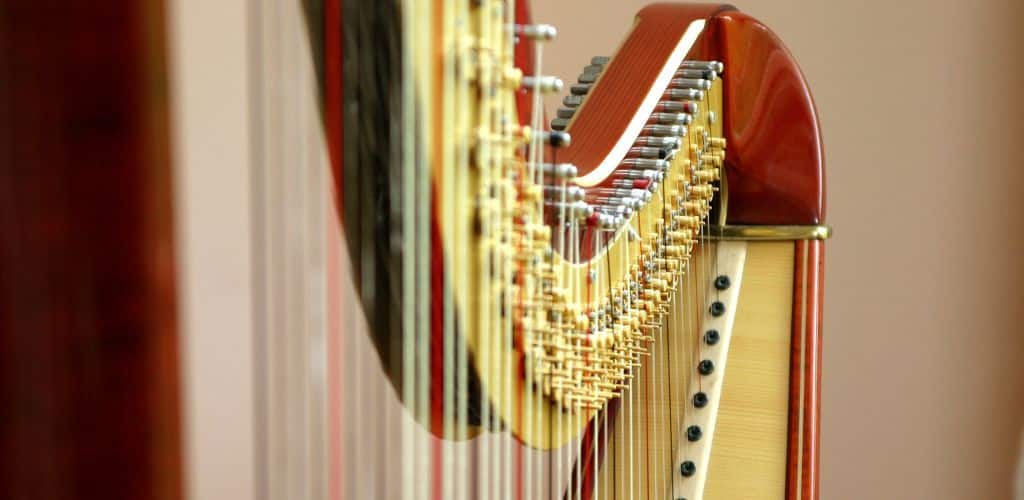
You’re not just selecting a part of your instrument when you pick out harp strings. You’re choosing the voice and soul of your harp, which the lower bass strings will sing under your fingertips.
Sound Quality and Characteristics
Gut strings produce a rich, warm sound and have a complex tonal quality, which can lend a nuanced expression to your musical instrument.
Nylon strings offer a brighter tone, are clearer, and can project more, making them a favorite for outdoor performances or larger venues. No wonder the Paraguayan harp has this string type to produce that certain cultural sound!
Wire strings carry a resonant ring with a longer decay.
Durability and Longevity
Gut strings are sensitive to changes in humidity and temperature, leading to more frequent tunings or replacements.
Nylon, steel, or copper wire strings are much more durable. They resist environmental changes well, giving you peace of mind if you frequently play in different settings.
You’ll find that wire strings don’t need to be replaced as often, which is a plus for your wallet and your time.
Player Comfort and Playability
Gut and wire strings produce beautiful tones but require more finger pressure, which can be tiring during long practice sessions.
Nylon strings are softer and easier on your fingertips, making them a great choice for beginners or those with sensitive hands.
If you’re playing all day, nylon’s forgiving nature helps reduce finger fatigue so you can focus on making beautiful music without discomfort.
Harp Strings I Recommend!
PYRAMID
The Pyramid 643/34 Irish/Celtic Harp strings provide a beautifully balanced and rich tone, offering a durable and responsive playing experience that enhances my traditional Celtic music sessions.
Pyramid 643/34 Irish / Celtic Harp
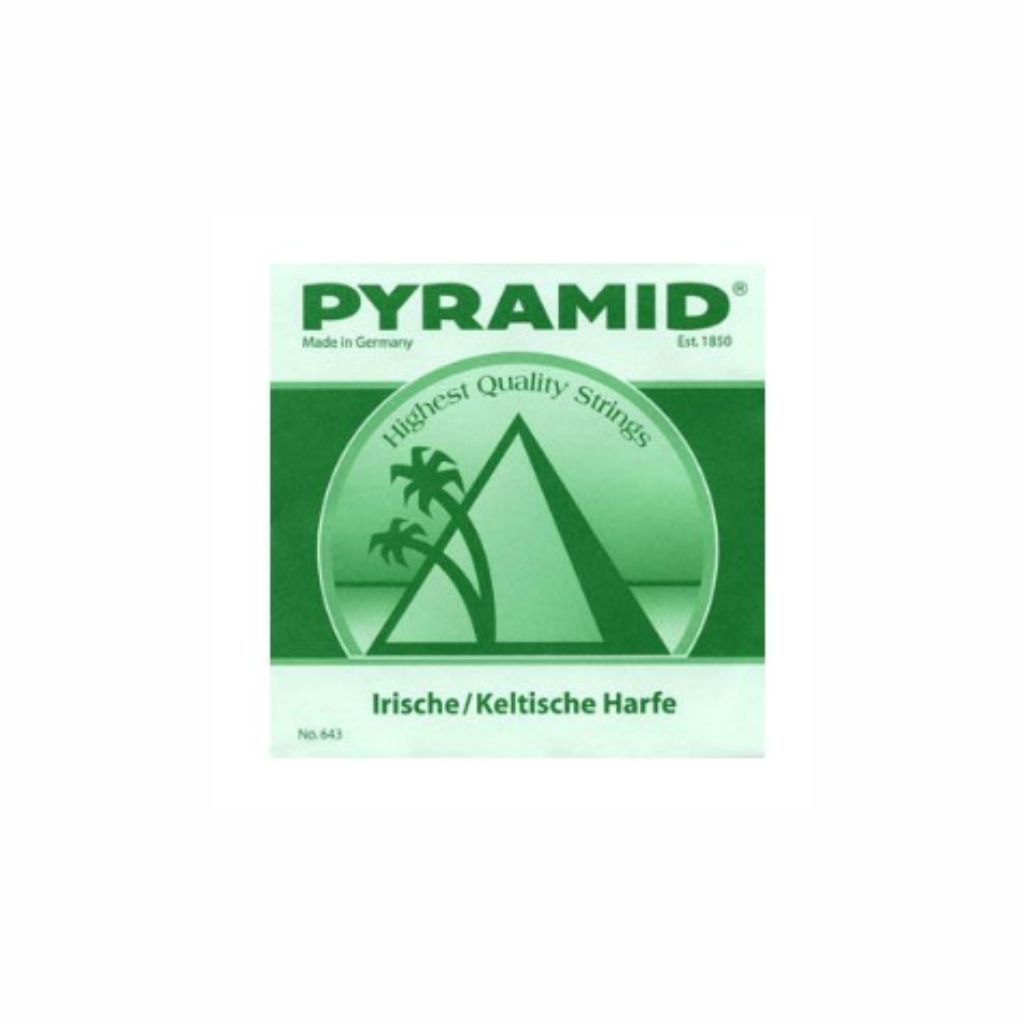
FEATURES: Nylon core with silver-plated copper wire winding
OTHER INFO: The full set includes strings for a 34-string harp
- Durable construction ensures the longevity of strings
- Delivers a bright and clear tone characteristic of Celtic music
- It may be more expensive than some other string brands
When you click ‘Check Price’, you’ll see there are loads of great places to buy this item. Our personal favorite is Sweetwater for the US, and Thomann and Gear4Music for the UK & Europe.
They are the largest music retailers, with excellent customer service, competitive prices, really fast shipping, and the longest guarantees.
The professional musician who wrote this article combined many things,
from the product build, manufacturer’s reputation through to feedback
from other users, to create our famous TedScore™.
GEAR4MUSIC
I always recommend the 36-string Harp String Set by Gear4music to my students because it offers a reliable and well-balanced range of tones.
It provides a cost-effective solution for my harp’s string replacement needs without compromising sound quality.
36 String Harp String Set by Gear4music
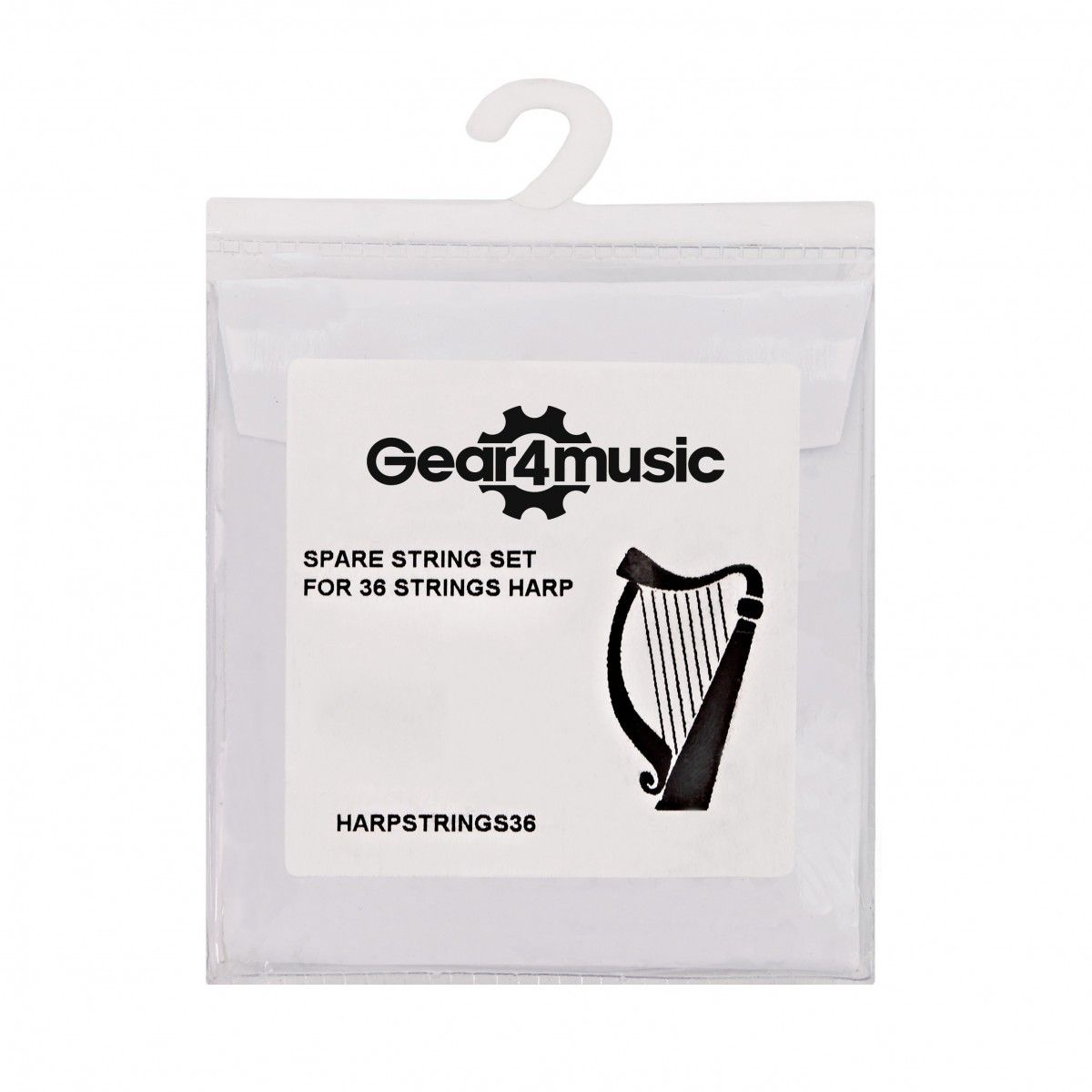
FEATURES: Complete set of Nylon Strings
OTHER INFO: Replacement Strings For Gear4music Harps
- Colour Coded To Signpost C And F
- None!
When you click ‘Check Price’, you’ll see there are loads of great places to buy this item. Our personal favorite is Sweetwater for the US, and Thomann and Gear4Music for the UK & Europe.
They are the largest music retailers, with excellent customer service, competitive prices, really fast shipping, and the longest guarantees.
The professional musician who wrote this article combined many things,
from the product build, manufacturer’s reputation through to feedback
from other users, to create our famous TedScore™.
THOMMAN
The Thomann Strings for Celtic Harp 36 have revitalized my instrument with their rich, vibrant tones and proven durable for daily practice and performance.
Thomann Strings for Celtic Harp
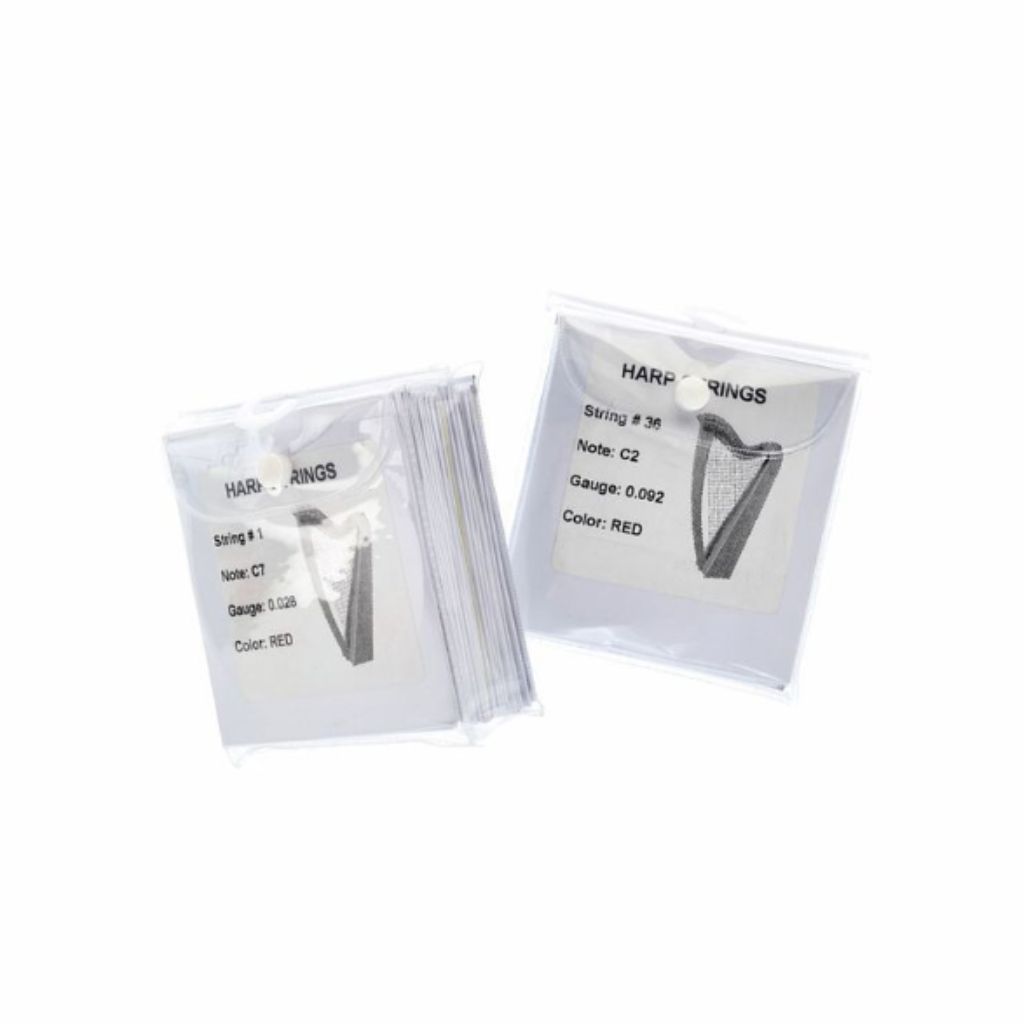
FEATURES: Set of 36 strings designed for Celtic harps
OTHER INFO: Covers a full range of pitches for a 36-string harp
- Reasonably priced, offering good value for harpists
- Nylon strings offer durability and resistance to humidity
- Nylon may not produce the same warmth as gut strings
When you click ‘Check Price’, you’ll see there are loads of great places to buy this item. Our personal favorite is Sweetwater for the US, and Thomann and Gear4Music for the UK & Europe.
They are the largest music retailers, with excellent customer service, competitive prices, really fast shipping, and the longest guarantees.
The professional musician who wrote this article combined many things,
from the product build, manufacturer’s reputation through to feedback
from other users, to create our famous TedScore™.
What Are Harp Strings Made Of:
Gut, Nylon, and Wire!
Harp strings shimmer with life, and they’re crafted from various materials to suit your musical vibe!
Don’t forget about these choices:
Gut strings, the traditional choice, give a warm, rich tone straight from the bellies of sheep.
Modern and nylon strings offer consistency and resilience, humming without fussing in changing weather. These are the top choices for a modern concert harp!
Metal wire strings, made of steel or copper, ring out with a bold, bright sound that carries in the air.
You’ll find that some harps marry different string types, creating a symphony of textures.
Lever harps love nylon for their easygoing personality
Pedal harps often use the gut to express deep emotions.
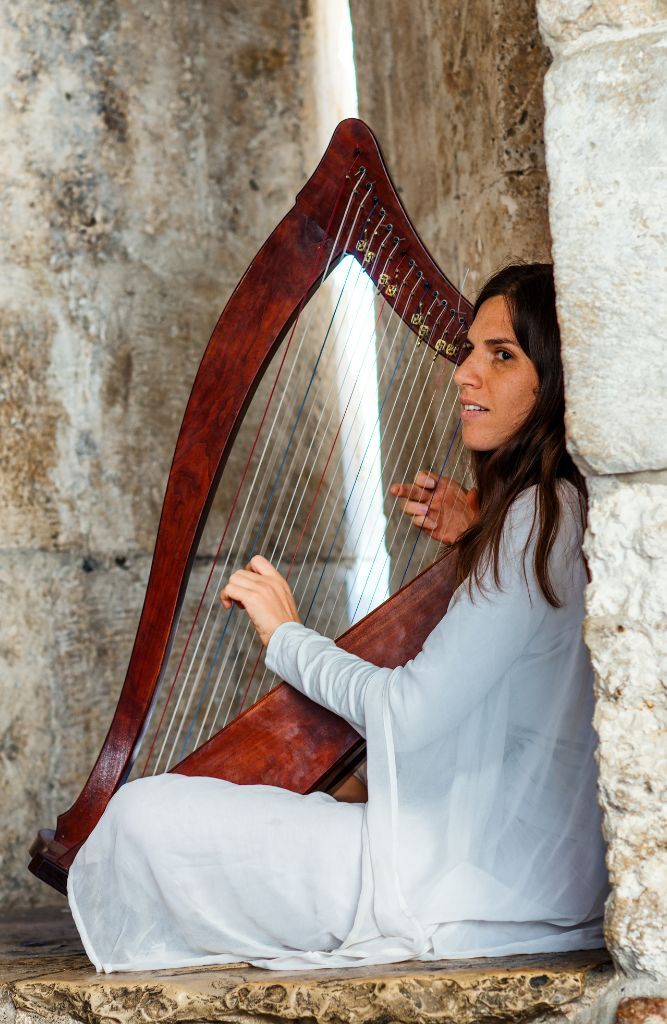
The choice is yours, shaping your harp’s voice like a painter chooses colors from a palette. Each string on your harp holds a note of your story, so pick your notes, the ones that resonate with your heart.
Feel like an angel and enjoy the harmony they bring to your fingertips!
Don’t go just yet!
If you’re interested in learning the harp and want to know the best harp makers have made for beginners, check out this next article!
FAQ's
The harp central core string is commonly made of gut, nylon, or metal (such as steel or bronze). They also come as wrapped strings, such as nylon wrapping and soft copper wrapping.
Harp gut strings are typically made from the dried and twisted intestines of sheep.
Wire harp strings are usually made of steel, bronze, or copper, often plated with silver or nickel for added strength and tonal quality.
Celtic harp strings are traditionally made of gut, nylon, or metal wires, depending on the desired sound and the instrument’s specific tradition.












This is an interesting overview of harp strings. From personal experience, I’ve found that the choice between gut, nylon, and wire strings isn’t just about the sound or durability but also the type of music you’re playing. Folk musicians tend to prefer the brighter tone of nylon strings, while classical harpists lean towards the traditional sound of gut strings. Wire strings, on the other hand, offer a unique resonance perfect for certain contemporary pieces. Would’ve been great to see a section on how different genres influence string choice.
Love the recommendations! Huge fan of PYRAMID strings myself. They really do make a difference in sound. Glad to see them getting some recognition here.
Are PYRAMID strings good for beginners too, or are they more for the pros?
While I agree that durability and longevity are important factors when choosing harp strings, I think the article underestimates the importance of sound quality. In my experience, wire strings, despite their durability, can’t match the warmth and depth of sound you get from gut strings.
Hey Bethan Semmens, I’ve been playing the harp for a few years now, and I’ve mostly stuck to nylon strings because I’ve heard they’re more durable. But I’m curious about gut strings. Do they really offer a significantly different sound quality, or is it more about the feel of the strings under your fingers? Also, how do they hold up over time compared to nylon? Thanks!